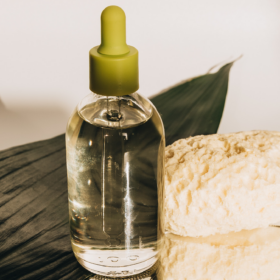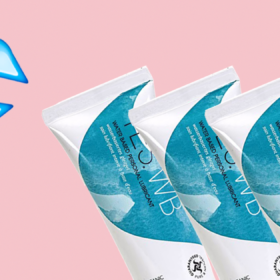
What are the different types of lubricant?
In this article
What's the lowdown?
There are three different types of personal lubricant: oil-based, silicone-based and water-based
Oil-based lubricants can cause condoms to become damaged or even break
Silicone-based lubricants can cause your silicone sex toys to degenerate and become damaged, making them less easy to clean
Water-based lubricants are generally suitable for everybody, as they wash away easily and are safe to use with condoms and sex toys but may not be as long lasting as other types
Get Yes water-based lube from Amazon (affiliate link)
There are a few reasons why you might want to use lubricant during sex, from vaginal dryness caused by contraceptive hormones or the menopause to trying something new, but in our opinion, you don’t need a reason at all.
Lubricant is a great addition to anybody’s sex life, be it for solo moments or time with a partner – it’s just a matter of choosing the right one for you. Research has shown that lubricant improves sexual pleasure no matter what kind of sex you’re having, so all that’s left to do now is decide which type is right for you.
And if you’re still not convinced, we’ve waxed lyrical about the multitude of reasons to use lube right here (seriously, we’re quite passionate about it).
What is personal lubricant?
Personal lubricants are lubricants used during sexual acts. They facilitate movement and reduce friction between one body part and another, or between a body part and a sex toy. There are three different types of personal sex lubricant: oil-based, water-based and silicone-based. Here, we’ll take a look at all three, when they should be used and who they’re suitable for.
Types of sex lubricant
It can be hard to know which lubricant is right for you, and easy to assume that any will do. But in fact, oil-based, water-based and silicone-based lubricants each come with their own list of pros and cons, which are important to know before you buy.
Oil-based lubricant
Oil-based lubricants have (you guessed it) oil as their lubricating ingredient, which makes them a brilliant choice for use in the shower, as they won’t rinse away very easily. They can also be used as a massage oil, which is handy!
You’ll need soap to get rid of any remnants of oil-based lubricant, though, so just be wary of this – soap (and yes, this includes intimate washes!) can irritate the vulva and vagina, disrupt your vagina’s natural balance and can make you more likely to develop bacterial vaginosis or thrush. Oil-based lubricants can also stain your clothes and sheets (think of the horror of dropping a roast potato down a brand new white top) so that’s something to bear in mind. Research has also found that oil-based lubricants can increase the quantity of Candida (the fungus responsible for thrush) in the vagina.
A big, lights-flashing, sirens-sounding alert here: oil-based lubricants can interact with the latex in condoms, breaking or damaging them and causing them not to work. So be extra careful which lubricant you opt for if condoms are your chosen contraceptive method.
Pros of oil-based lubricant:
- Don’t rinse away easily
- Can be used as massage oil
Cons of oil-based lubricant
- May increase the risk of BV ot thrush
- May stain sheets or clothes
- Reduce the effectiveness of condoms
Water-based lubricant
Water-based lubricants are less long-lasting than both oil-based and silicone-based lubricants, and wash off in water, so aren’t ideal for use in the shower. You’ll need to reapply a water-based lubricant more frequently than you would other types of lubricant, so that’s something to consider if you want to avoid interruption.
That being said, water-based lubricants are safe for anybody to use, won’t stain your clothing or sheets and don’t interact with condoms or sex toys. They’re less likely to cause a reaction in people with sensitive skin than oil-based lubes, particularly as they don’t need soap to be rinsed away, so there won’t be as much disruption to your vagina’s natural balance of bacteria during clean-up.
You can buy Yes water-based lube from Amazon. We’re in love with this lube – it’s non-irritating, pH balanced and moisturising to boot – and we’re obsessed with how long-lasting it is, too. This is an affiliate link but we only recommend products we’ve tried or love.
Pros of water-based lubricant
- Safe with condoms and sex toys
- Great for sensitive skin
Cons of water-based lubricant
- Less long lasting compared to oil-based or silicon-based products
Silicone-based lubricant
Like oil-based lubricant, silicone-based lubricant doesn’t rinse away easily with water, and you’ll need soap to wash it off. This makes it great for use in the shower, but remember that soap can be irritating to the delicate skin of your vulva and vagina, so if you have sensitive skin in this area, this is something to consider. Silicone-based lubricants can also stain, so watch out for your bed sheets and clothes.
Unlike oil-based lubricants, silicone-based lube is safe to use with condoms, and is brilliant for sensitive skin. They do come with a word of warning for your sex toys, though. Over time, silicone-based lube can deteriorate silicone toys, so it’s probably best to keep it away from that eye-wateringly expensive vibrator your friend convinced you to buy after too much after-work wine (and which you’re now not sure you could live without). This damage can cause abrasions on the surface of the sex toy, making it harder to clean and increasing the amount of bacteria that it could carry. Not ideal.
Pros of silicon-based lubricant
- Long lasting
- Safe to use with condoms
Cons of silicon-based lubricant
- May stain sheets
- Can damage sex toys
- May need to be washed off with soap
Advice for vaginal dryness
If you’re having trouble with vaginal dryness and think it might be caused by your contraception, we have a team of brilliantly talented doctors at hand. Each of our doctors have a Diploma in sexual and reproductive health, so you can count on them to know their stuff when it comes to lube, vaginal dryness and contraception. Book a consultation at a time that suits you, and receive a detailed action plan after your appointment.
Our medical review process
This article has been medically reviewed for factual and up to date information by a Lowdown doctor.


